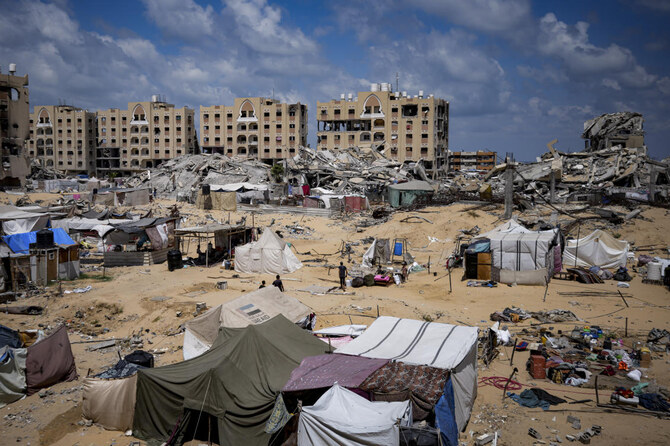DOHA: Negotiators seeking a Gaza ceasefire were set to meet for a second day in Qatar on Friday, while top European diplomats were expected in Israel to stress the urgency of averting a wider war.
The on-and-off truce talks reconvened in Qatar’s capital on Thursday without Hamas, which has accused Israel of obstructing a deal and insists on the implementation of previously agreed terms.
Months of talks have yet to secure the return of hostages held by militants in Gaza or staunch the spiralling death toll, which authorities in Hamas-ruled Gaza on Thursday said had topped 40,000 in the Palestinian territory after more than 10 months of war.
US National Security Council spokesman John Kirby said the talks had “a promising start” but acknowledged “there remains a lot of work to do.”
Israel’s main military supplier the United States has been mediating the talks with Qatar and Egypt.
The United States and its allies see the proposed Gaza truce as key to de-escalating soaring regional tensions, particularly with Iran.
“This is a dangerous moment for the Middle East. The risk of the situation spiralling out of control is rising,” British Foreign Secretary David Lamy said ahead of his visit with French Foreign Minister Stephane Sejourne.
During meetings with Israel’s Foreign Minister Israel Katz and Minister of Strategic Affairs Ron Dermer, they would “stress there is no time for delays or excuses from all parties on a ceasefire deal” in Gaza, according to Britain’s foreign ministry.
Sejourne said “any miscalculation in the current situation could provoke a generalized conflagration.”
While talks take place in the Gulf emirate, bombs have continued to fall in Gaza.
As they struggled to recover bodies from the ruins of yet another air strike on Thursday, Palestinians in north Gaza questioned why, when Israeli Prime Minister Benjamin Netanyahu’s team was in Qatar.
“Why did Netanyahu send a delegation to the talks while we are being killed here?” in Jabalia, Mohammed Al-Balwi said as rescuers around him pulled bodies from the concrete wreckage.
They had found “limbs on the ground,” he said.
Fears of a wider Middle East war have soared since the July 31 killing of Hamas political leader and truce negotiator Ismail Haniyeh in Tehran. Iran and its allied groups in the region blamed Israel and vowed revenge.
Haniyeh’s death came hours after an Israeli strike killed Fuad Shukr, the military commander of Lebanon’s Iran-backed Hezbollah movement, which has exchanged near-daily cross border fire with Israeli forces.
The Gaza war has also drawn in Tehran-aligned groups in Iraq, Syria and Yemen.
The US military said its forces had destroyed a “ground control station” operated by Yemen’s Iran-backed Houthi rebels. The Houthis have for months fired missiles and drones at shipping in waterways vital to world trade off Yemen.
The Houthis, like Hezbollah, say they are acting in support of the Palestinians.
Violence has also surged in the Israeli-occupied West Bank.
Israeli President Isaac Herzog on Thursday condemned a Jewish settler attack on a West Bank village that the Palestinian Authority said killed one Palestinian and wounded another.
The Israeli military said dozens of Israeli civilians, some masked, entered Jit on Thursday evening and “set fire to vehicles and structures in the area, hurled rocks and Molotov cocktails.”
It added that it had opened an investigation and was looking into reports of a fatality.
Since the war in Gaza began, hundreds of Palestinians have been killed in the West Bank by the Israeli army or settlers, according to an AFP count based on official Palestinian data.
During the same period in the West Bank, at least 18 Israelis, including soldiers, have been killed in Palestinian attacks, according to official Israeli data.
The Qatari foreign ministry said Gaza truce negotiations would continue on Friday.
Mediators remain committed “in their endeavours to reach a ceasefire in the strip that would facilitate the release of hostages and enable the entry of the largest possible amount of humanitarian aid into Gaza,” a ministry spokesperson said.
They are seeking to finalize details of a three-phase proposal initially outlined by US President Joe Biden in May.
While Hamas is not directly taking part, an official of the Islamist movement, Osama Hamdan, told AFP the group would join if the meeting set a timetable for implementing the agreed terms.
He added that Hamas would not engage in negotiations that “give Netanyahu more time to kill our Palestinian people.”
Netanyahu has called Hamas leader Yahya Sinwar “the only obstacle to a hostage deal.”
Hamas’s unprecedented October 7 attack on Israel that triggered the war resulted in the deaths of 1,198 people, mostly civilians, according to an AFP tally of Israeli official figures.
Militants also seized 251 hostages, 111 of whom are still held in Gaza, including 39 the military says are dead.
Some were freed during a one-week truce in November.
The war has displaced almost the entire population of Gaza and destroyed much of its housing and other infrastructure, leaving widespread shortages of food.
Gaza’s health ministry, which does not provide a breakdown of civilian and militant casualties, on Thursday said the war has killed at least 40,005 people.
The United Nations human rights chief, Volker Turk, called it a “grim milestone for the world.”
Gaza ceasefire talks to resume for 2nd day in Qatar
https://arab.news/zyzb2
Gaza ceasefire talks to resume for 2nd day in Qatar

- The on-and-off truce talks reconvened in Qatar’s capital on Thursday without Hamas
- United States and its allies see the proposed Gaza truce as key to de-escalating soaring regional tensions, particularly with Iran
Hezbollah leader says Israeli attacks on Lebanon unacceptable

- “This aggression must end,” Qassem said in a televised address
BEIRUT: Hezbollah leader Naim Qassem said Saturday that he could not accept continued Israeli attacks on Lebanon, a day after the first strike on Beirut since a November ceasefire.
“This aggression must end. Israel... bombed Beirut’s southern suburbs for the first time since the truce... we cannot allow this to continue,” Qassem said in a televised address.
Fitness enthusiasts challenge themselves with pre-iftar hikes in Pakistani capital

- Hikers set out hour before sunset, break fast on trails on Margalla Hills National Park
- Participants say pre-iftar hikes help boost fat burning, maintain weight in Ramadan
ISLAMABAD: Zarnab Tahir struggled to catch her breath as the steep incline of the hiking trail at Islamabad’s picturesque Margalla Hills tested her endurance. Hiking can put people through physical exertion, especially when they do it on an empty stomach.
An hour before the sun sets and the call to prayer blares out from various mosques located in Pakistan’s capital city, a group of fitness enthusiasts take to the hiking trails in Margalla Hills National Park.
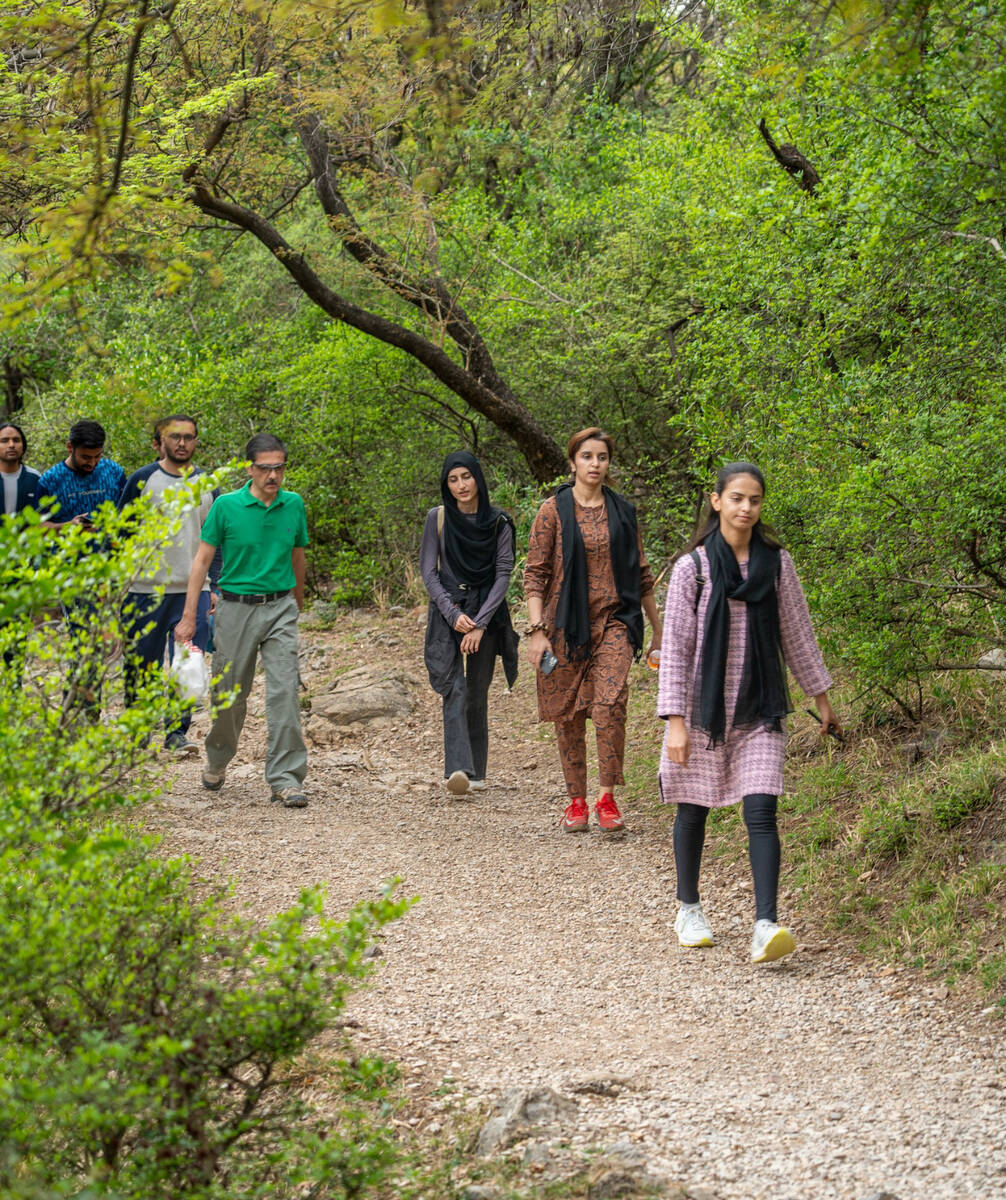
Islamabad Run With Us — IRU — which describes itself as Pakistan’s “pioneering running community,” is behind the pre-iftar hiking initiative.
“When you engage in pre-iftar (physical) activities during Ramadan, it gives you extra energy, an extra boost,” Qasim Naz, who founded IRU in 2016, told Arab News on hiking trail number three.
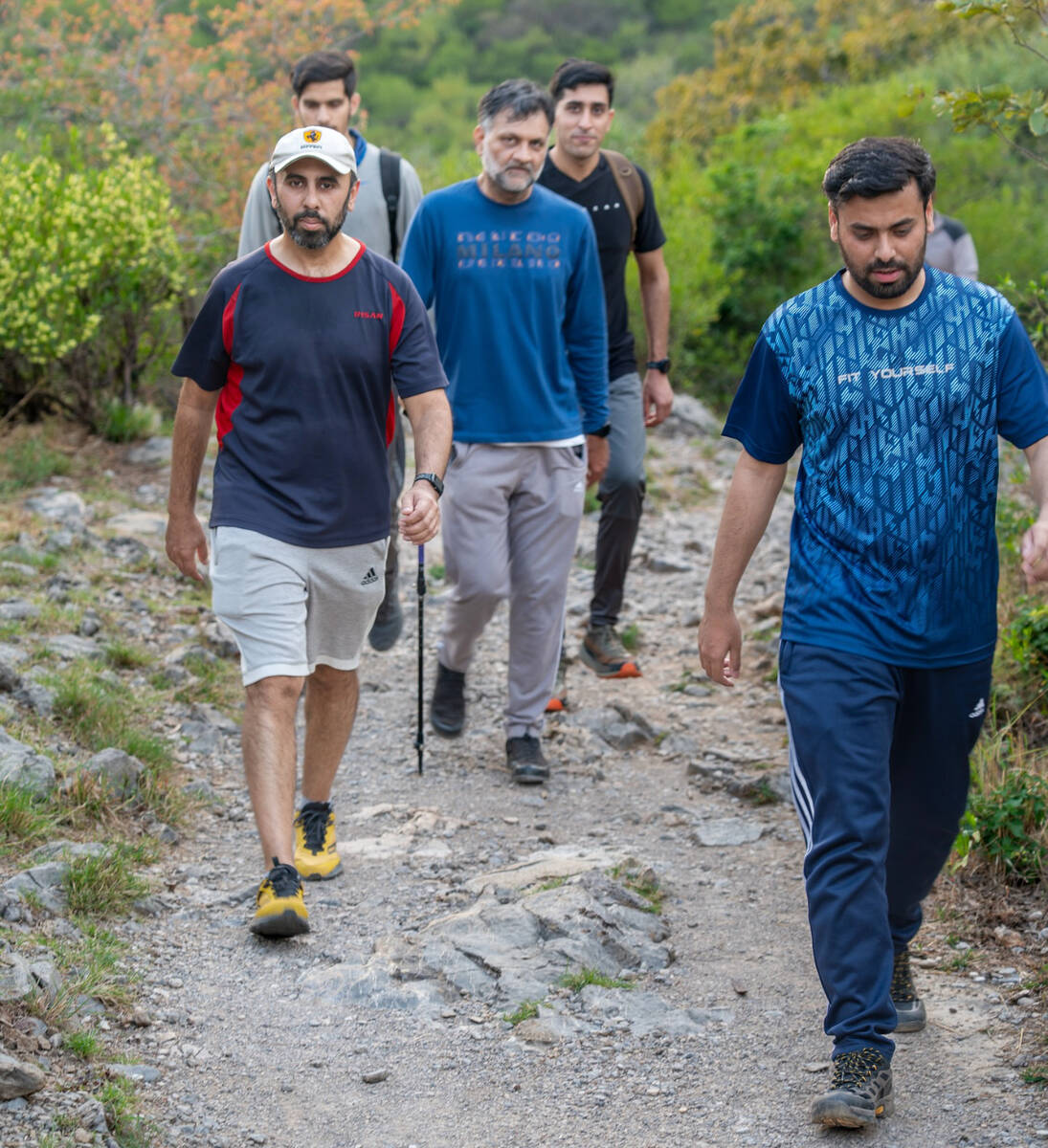
“And when someone joins in on an activity once or twice, they figure out it’s not that hard and they can sustain it comfortably.”
Naz stresses that staying active during the holy month is essential. The IRU organizes five activities a week, which include two runs and three hikes.
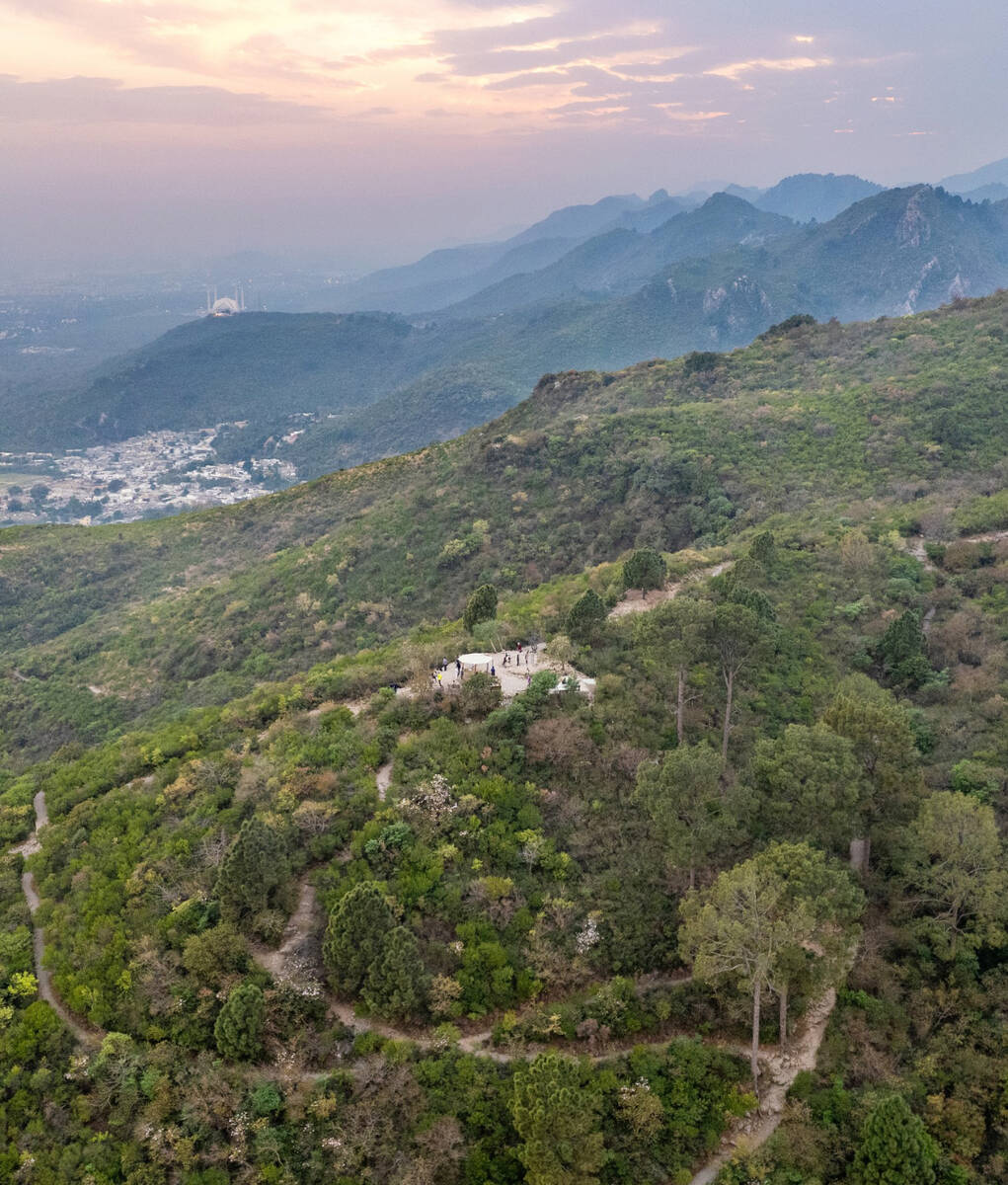
“Either we can maintain our weight, or if our goal is weight loss, we can achieve it by being in a calorie deficit while eating a healthy diet and exercising,” Naz explained.
Tahir, 22, meanwhile, said that she was committed to reaching the top of hiking trail before sunset. This was the second time she was hiking with IRU.
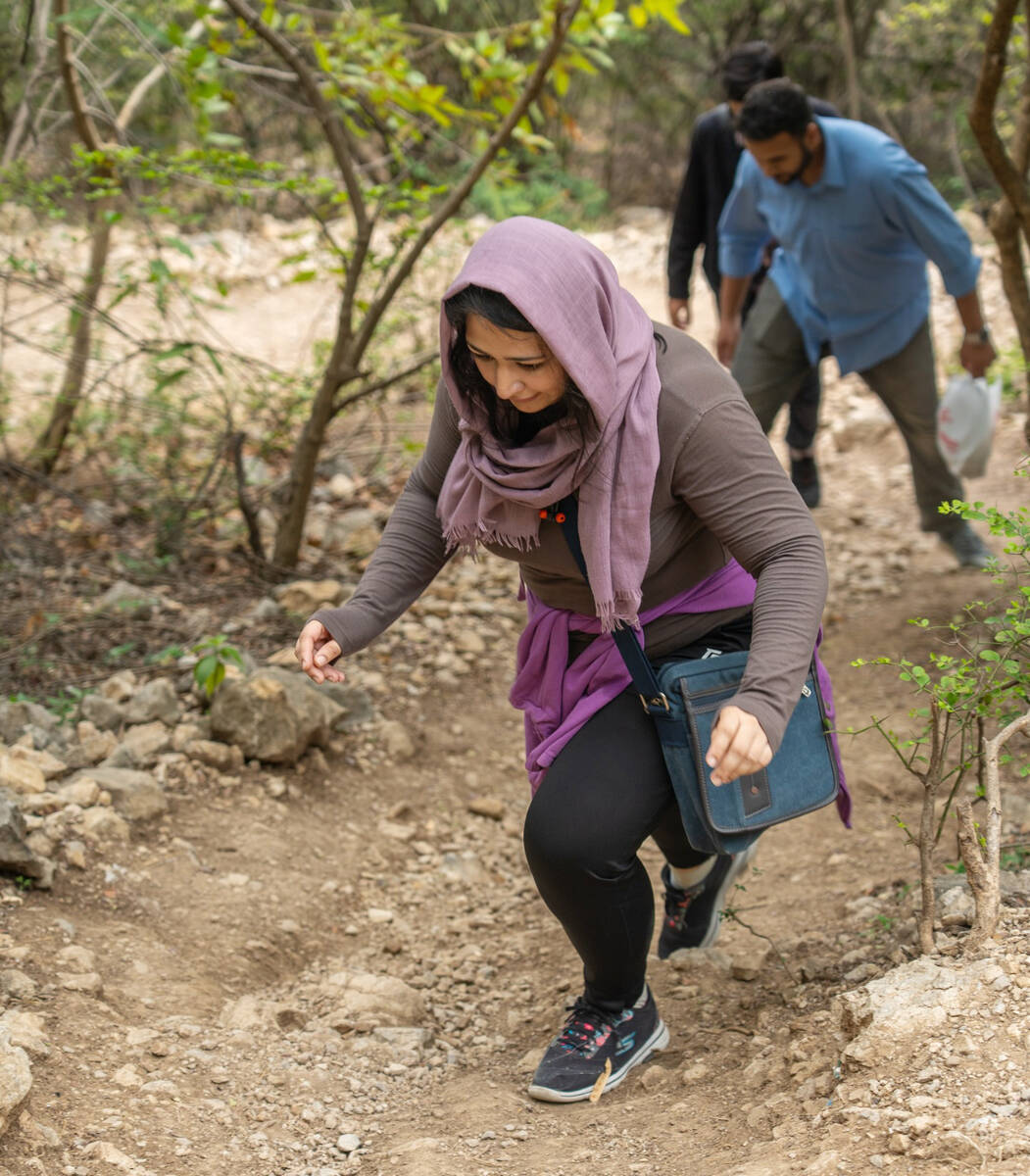
She agreed with Naz that group activities are “much easier” to sustain.
“I think it is important to go at your own pace and it’s so much easier with the group,” Tahir, a content creator, told Arab News.
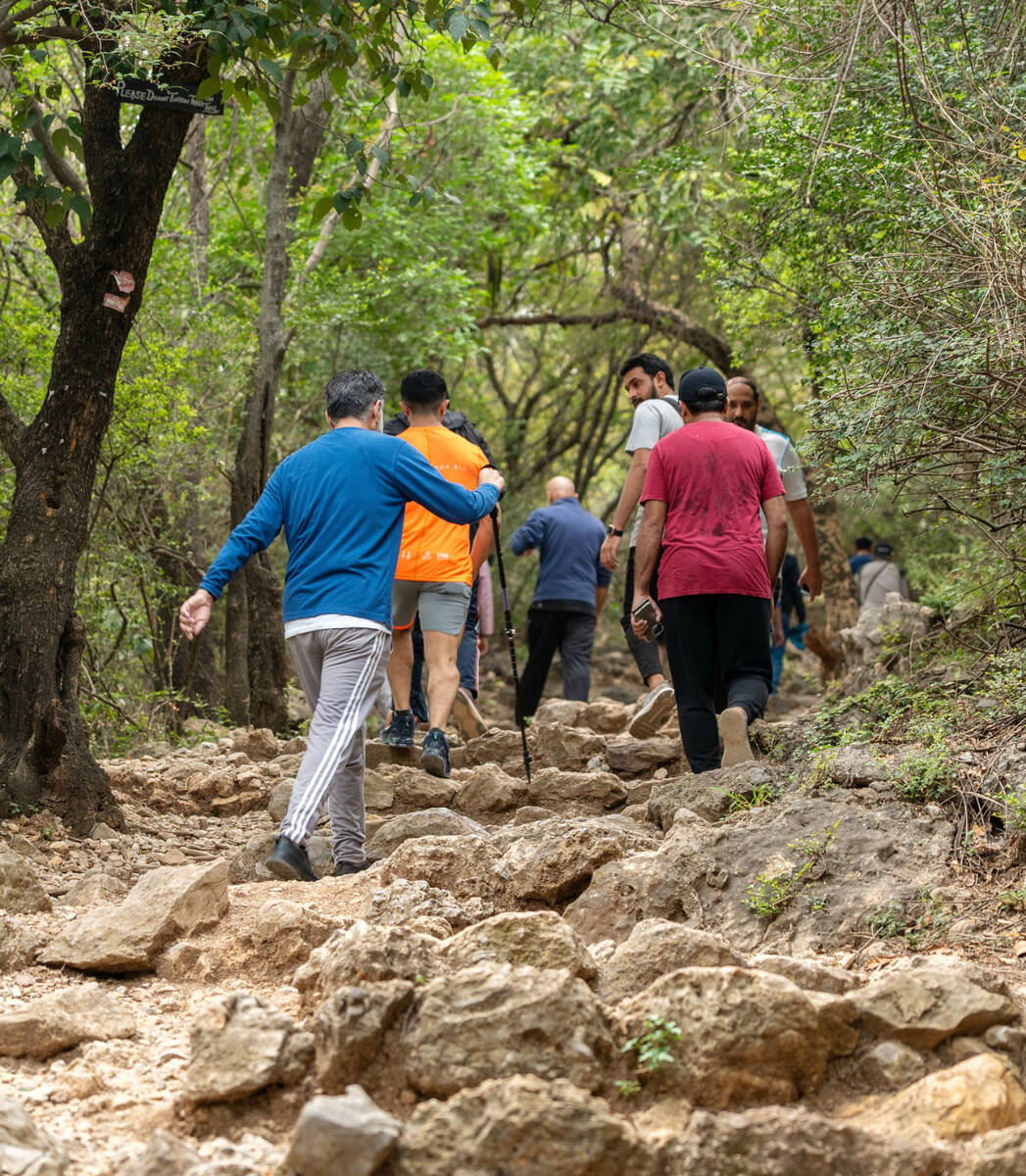
“If you go alone, it’s kind of more difficult and you are, like, really slow but if you go with the group you can maintain that pace and I think it’s much easier that way.”
Mahwish Ashraf, a journalist associated with a foreign diplomatic mission in Islamabad, shared how she struggled the first time that she went on a pre-iftar hike with IRU.
“The first time I was hiking, I returned from in between, I couldn’t complete it,” she admitted. “So, this is my second time hiking with the IRU, and gladly, I’m at the main point, the meeting point.”
Eraj Khan, a commercial specialist visiting from Australia to spend Ramadan with his family, said pre-iftar hikes give one “lots of energy.”
“For fat burning, it’s a great activity,” Khan said. “Especially because the last two hours of fasting are the hardest, most people feel really hungry. But so far, I’m loving it.”
As the clock continued to tick and evening settled in, the hikers began to pick up their pace. For Tahir, reaching the top of the trail before sunset was a victory in itself.
She had pushed past exhaustion, embraced the challenge and proved to herself that she was capable of more than she thought she could achieve.
And according to her, hiking with the group made all the difference.
“The energy of the group keeps you going,” she said. “Even when you feel like stopping, you see everyone else moving forward, and you push through.”
French fry revolution satisfies Ramadan night cravings in Jeddah

- One of Crusty’s visitors, Sukinah Qattan, told Arab News: “This atmosphere doesn’t just enhance the joy of tasting food; it also enriches Saudi Arabia’s culinary sector, supports local chefs
JEDDAH: During the holy month of Ramadan, Jeddah’s streets come alive with food stalls, drawing crowds to savor local favorites such as the popular “basta” fries pop-up experience.
Stalls, particularly those selling French fries, line the streets, bringing people together in a celebration of local flavors.
Food carts and traditional kiosks set up in alleyways of residential areas and in public squares serve delicious dishes and beverages, evoking nostalgia and reviving the spirit of the past.

The word “basta” comes from the Arabic term for simplicity, “basata,” to represent an experience that is modest, affordable, and rich in flavor.
In these attractive settings, markets bustle with activity as the aroma of kebda (liver), balila (chickpeas), and French fries fills the air, bringing the warmth of social gatherings that define the holy month.
Keeping tradition alive
Abdulrahman Ghazi, owner of the food stall Balilat Ajdadna, spoke to Arab News about the city’s love for its street foods.
“French fries have always been a Ramadan favorite, along with balila and liver. We’ve been serving customers in Al-Safa district for 28 years, and our loyal patrons know us well,” he said.
“We prepare kebda using an old traditional method, but with our own twist. We cook it with natural oil, suet, and lamb fat, without using any additional oils. This technique is highly favored by many,” Ghazi explained.
The authentic way of preparing balila takes more time and requires at least three hours of slow cooking over low heat with plenty of water, he added.
“In the past, balila was soaked for 12 hours before cooking to ensure it was thoroughly cleaned of bicarbonate residue, a crucial step that many overlook today. Unfortunately, some now use bicarbonate with a pressure cooker to speed up the process, which takes away from its true flavor.”
He insisted that the correct way to prepare balila is to let the chickpeas soak overnight, wash it thoroughly, and then cook it slowly.
“That’s why we call it ‘Balila Ajdadna’ — because it is made just like our ancestors used to prepare it in Makkah, where we originally come from,” Ghazi added.
The stall’s balila is priced is SR5 ($1.30) for a small plate and SR10 for a large plate. The small plate of fries costs SR6 and the large goes for SR12, with all the sauces one could wish for.
Although rising costs, particularly for oil, have led to price increases, Ghazi said that they strive to keep prices stable.
“Our prices remain the same throughout the year, even during Ramadan. We do not impose additional taxes, and we have always absorbed the costs ourselves.”
French fries take a new turn
While some vendors have remained loyal to tradition, serving fries with classic Saudi sauces such as garlic and homar (tamarind), others have introduced elements from various cuisines, elevating the dish beyond its conventional form.
In an interview with Arab News, Saudi content creator Abdoush, who has over half a million followers on social media, shared his inspiration for launching his fries stall — one that locals call “The Rich Man’s Stall” because its fries sell for SR60.
After years of perfecting his steak-cooking skills, Abdoush decided to elevate the French fries game by adding premium steak cubes, topped with his signature sauce.
“For me, it’s all about taking something familiar and turning it into an unforgettable experience,” he said.
His steak fries stall Crusty is located on Ali Abou Al-Ola street, operating from the backyard of a neighborhood home and serving lines of eager customers.
With innovative ingredients, such as wok-tossed steak cubes finished with a torch, Abdoush’s stall has attracted thousands of visitors during Ramadan.
The stall is a bustling business, with four counters dedicated to fries. Around 20 workers manage the operation, going through over 100 kg of steak per day and an unmeasured amount of potatoes.
According to Aboush, Crusty serves an average of 500 customers on weekdays, while on weekends the number soars to over 700.
“We do this out of love and passion. Food is truly amazing, it’s a blessing,” he said.
But what makes Abdoush’s fries expensive?
“It’s all about the process of making the fries. We don’t just fry them in regular oil — we add tallow and beef fat from the steaks. The steak we use is Russian striploin, a high-grade cut known for its marbling and rich fat content. We add about half a steak on top of the fries,” he explained.
“We also make a special sauce that we drizzle over the steak fries, but I highly recommend adding some homar (tamarind). It gives the dish a unique touch.”
Abdoush’s inspiration behind the steak fries is connected to Jeddah’s culture, especially the rise of French fry pop-ups. “Personally, I love making steaks, and with five years of experience, this was the perfect concept to bring to life.”
Crusty started last year and its popularity this year has been on a whole new level.
After Ramadan, Abdoush plans to launch his first Crusty restaurant specializing in steaks. “We won’t just serve French fries and steaks, we’ll also be adding burgers to the menu,” he said.
Residents and visitors flock to these stalls, where they not only indulge in delicious food but also experience live cooking demonstrations.
One of Crusty’s visitors, Sukinah Qattan, told Arab News: “This atmosphere doesn’t just enhance the joy of tasting food; it also enriches Saudi Arabia’s culinary sector, supports local chefs, and reinforces the presence of traditional dishes in the modern cultural scene.”
Other fries stalls offer more affordable fries. For example, Adani Bar Cafe and Ma’loom restaurant serve fries for no more than SR15.
However, their innovation lies in cutting the potatoes into cubes, instead of the traditional fries shape, and topping them with a cilantro, garlic, and lemon sauce, which visitors love.
Anas Abbas, a fries enthusiast from Jeddah, told Arab News: “Every Ramadan, I make sure to visit Adani Bar. I love their fries. They’ve truly become a Ramadan tradition. I always bring some home for my mother after her Taraweeh prayers because she also appreciates this delicious treat.”
Ed Bethell targeting international glory with Regional in Al Quoz Sprint on Dubai World Cup night

- Royal Ascot-winning trainer looks to extend his success beyond UK at Meydan Racecourse next Saturday
- Regional set to take on world’s fastest turf sprinters in latest chapter of ‘rags-to-riches story’
LONDON: Royal Ascot-winning trainer Ed Bethell is set to chase his first international Group 1 victory as his star sprinter Regional lines up for the Al Quoz Sprint on Dubai World Cup night next weekend.
Within just four years of earning his trainer’s license, Bethell has already made a name for himself on the British racing scene, securing a Group 1 victory in the Haydock Sprint Cup with Regional and a Royal Ascot win in the Britannia Stakes with Mickley.
He was also on the verge of another major triumph when Point Lynas crossed the line first at the York Ebor Festival, only to lose the race following a stewards’ inquiry.
Now, Bethell is looking to extend his success beyond British shores, with Regional primed for the prestigious six-furlong sprint at Meydan Racecourse next Saturday.
Regional has been a revelation under Bethell’s training since being bought as a horse-in-training for just 3,500 guineas ($4,750) at Tattersalls.
Since then, he has finished in the prize money in 16 of his 17 starts for Bethell and his owners, amassing over £575,000 ($744,000) in earnings. His resume includes a Group 1 win at Haydock and a runner-up finish in the King Charles III Stakes at Royal Ascot in 2024.
Speaking to Great British Racing International, Bethell expressed his admiration for the sprinter and his confidence heading into Dubai.
“Regional is incredibly special. Any horse to win you a Group 1 is special, but I guess it’s a rags-to-riches story, and I probably will never find another like him. He had a big break, and his work has been really good coming into this race. He has been absolutely great,” Bethell said.
The 31-year-old trainer is no stranger to the Al Quoz Sprint, having previously had Moss Gill contest the race in 2021, though COVID-19 restrictions prevented him from attending.
This time, he hopes to be trackside for what could be a career-defining moment, adding: “Hopefully, it will be a great experience.”
Bethell, who trains from his base in Yorkshire, has enjoyed a rapid rise through the British training ranks.
His 20 percent strike rate on turf in 2024 has caught the attention of leading owners across the globe, with backing from the the US, Asia, and the Middle East.
With Regional set to take on some of the world’s fastest turf sprinters in Dubai, a strong performance on World Cup night could further cement Bethell’s status as one of Britain’s rising training stars.
Reflecting on his progress since taking out his license, Bethell said: “We have improved year-on-year. Our facilities and our team are bigger and better than ever. It’s exciting, but we want to continue to improve and get better.”
US woman released by Taliban in Afghanistan

- “American citizen Faye Hall, just released by the Taliban, is now in the care of our friends, the Qataris in Kabul, and will soon be on her way home,” Khalilzad wrote on X
- Khalilzad posted a picture of Hall smiling with Qatar representatives ahead of her departure from Afghanistan
WASHINGTON: An American woman has been freed by the Taliban in Afghanistan after she, two Britons and their Afghan translator were detained earlier this year, Washington’s former envoy to Kabul, Zalmay Khalilzad, said Saturday.
“American citizen Faye Hall, just released by the Taliban, is now in the care of our friends, the Qataris in Kabul, and will soon be on her way home,” Khalilzad, who has been part of a US delegation working on Taliban hostage releases, wrote on X.
While at the Qatari embassy in Kabul, Hall “has been confirmed in good health after undergoing a series of medical checks,” said a source with knowledge of the release.
She was released on Thursday following a court order and with logistical support from Qatar, the source added.
Hall, who has been identified by the Taliban’s interior ministry as Chinese-American, was detained in February along with Peter and Barbie Reynolds, who are in their 70s, as they traveled to the British couple’s home in central Bamiyan province.
Their Afghan translator was additionally arrested.
Taliban officials have refused to detail the reasons for their arrest, but one report said Hall had been detained on charges of using a drone without authorization.
In his announcement, Khalilzad posted a picture of Hall smiling with Qatar representatives ahead of her departure from Afghanistan.
Khalilzad had been in the Afghan capital earlier this month on a rare visit by US officials to meet Taliban authorities, accompanying US hostage envoy Adam Boehler.
Following their visit, the Taliban government announced the release of US citizen George Glezmann after more than two years of detention, in a deal brokered by Qatar.
He and Hall are among several Americans to be released from Taliban custody this year.
In January, two Americans detained in Afghanistan — Ryan Corbett and William McKenty — were freed in exchange for an Afghan fighter, Khan Mohammed, who was convicted of narco-terrorism in the United States.
At least one other US citizen, Mahmood Habibi, is still held in Afghanistan.
The British couple detained with Hall remain in Taliban custody.
Their daughter has expressed grave fears for her father’s health and appealed to the Taliban authorities to free them.
The Reynolds, who married in Kabul in 1970, have run school training programs in the country for 18 years.
They remained in Afghanistan after the Taliban takeover in 2021 when the British embassy withdrew its staff.
The government in Kabul is not recognized by any country, but several, including Russia, China and Turkiye, have kept their embassies open in the Afghan capital.
Qatar, too, has maintained diplomatic channels with the Taliban and has facilitated negotiations for the release of US hostages.
Since US President Donald Trump’s reelection, the Kabul government has expressed hopes for a “new chapter” with Washington.


